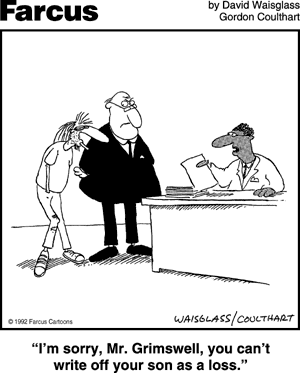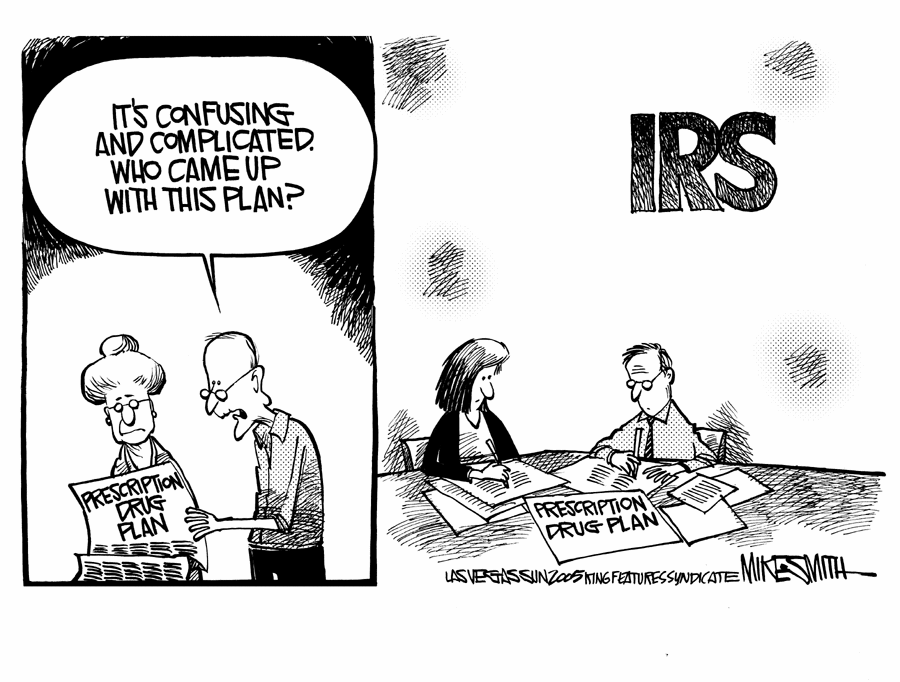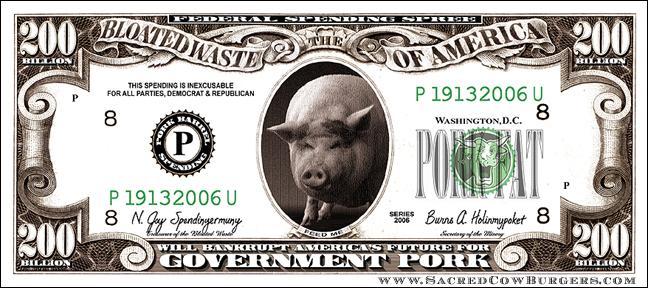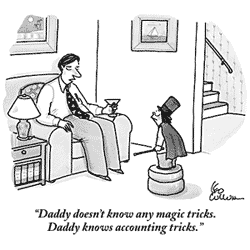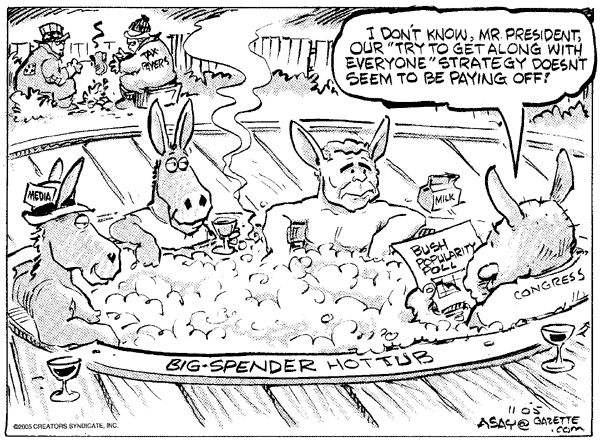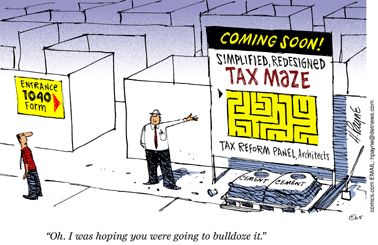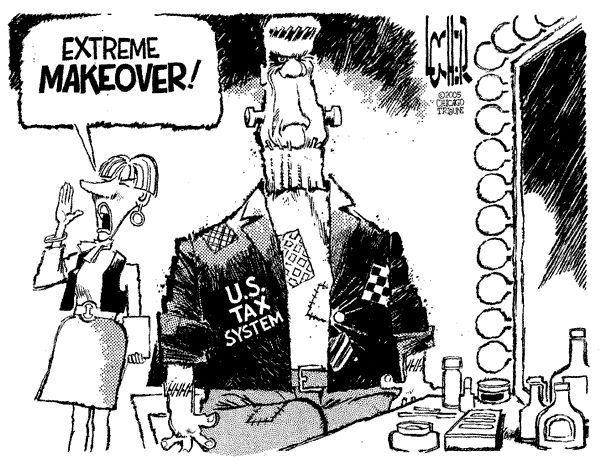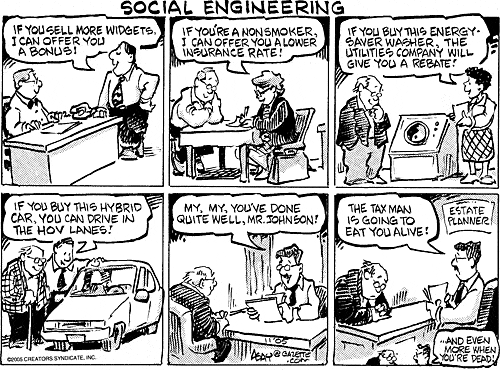Untangling Tax Reform – From the Wall Street Journal
News From IRS:
The Income Tax and How it Undermines the U.S. Economy
Music to Song-writers Ears: Lower Taxes – Possible lower rates for song-writers’ royalties? If this special deal passes, the flood-gates will open as other professions lobby for similar tax treatment.
Inherited IRA + Explaining Tax Return Issues
Q:
Subject: Inherited IRA 50% PenaltyDear Kerry Kerstetter,Your web page and blog are great!
I have searched the web high and low for an answer to my question about Inherited IRAs, and can't find the answer anywhere. Maybe it's appropriate for your blog, as many people are probably in the same situation:
I inherited an IRA from my mother, who died in 1996. Web pages tell me I should have begun taking out yearly minimum distributions in 1997, or I should have cashed out the whole account by the end of 2001. If not, there is a 50% penalty on what I should have taken out.
The problem is, I didn't know any of this until now.
So what to do now in 2005? No web page anywhere has the answer!
I guess the strictly correct answer according to the IRS is that I must file amended returns for every year from 1997 to 2004 and report the under-withdrawal and pay the 50% penalty, and calculate interest, and late payment fees. But amending 8 years of tax returns would drive me crazy, and I would prefer to just forfeit the whole account instead!
So should I just start taking minimum distributions in 2005 and hope the past returns don't get audited? Or is there another solution?
Thanks for any help, and if there is a fee for your answer, I would be glad to pay.
A:
You do really need to work with a qualified tax pro to handle the several issues that this situation raises for you.
Going back and amending most of those older years' tax returns isn't even a valid option because of the three year statute of limitations barring any changes to any 1040 that has been filed more than three years ago. Even filing 1040Xs for the three open years would be dangerous for you. If you've been reading my blog, you know that the coast still isn't clear from the risk of IRS initiating full-blown audits of taxpayers who file amended returns.
The old adage that "ignorance of the law is no excuse" is least appropriate in the area of tax law. Our convoluted mish-mash of a tax system is so confusing to absolutely everybody that penalties are routinely waived by IRS for those persons who can make the case that the oversight was unintentional.
Technically, somebody involved with the transfer of the IRA to your name (such as the account custodian or probate attorney) should have notified you of the requirement to start withdrawals from the account by the end of 1997, as should have your personal tax preparer, if you had told him/her about the inheritance. Since nobody obviously told you about that requirement, you would probably be best off starting the withdrawal plan in 2005. You should attach an explanation of the circumstances creating the delay to your 1040.
This obviously isn't the only way in which to handle this situation for you. As I said earlier, you should consult with a tax pro, who may either endorse this strategy or advise another option, especially if there are other pertinent details that you didn't mention in your email to me.
Good luck. I hope this helps.
Kerry Kerstetter
Follow-up:
Dear Kerry,Thank you very much for your informative answer.
The only thing I didn't mention was that on the Form 5498 I receive each year from Fidelity, it is always written in Bold print in Box 11:
"Required Minimum Distribution for 2004 - NO".
This should certainly help my case for pleading ignorance of the required distribution for previous years. I will attach a copy of Form 5498 and an explanation to my 2005 return (and do the required distribution for 2005).
I also noticed that on Form 5329 for reporting excess accumulations, you can only pay a penalty for 2005. The IRS doesn't make it easy to pay the 50% penalty for previous years.
Just curious why there is a lower audit rate for returns with lots of explanatory attachments, as you say on your web page. Off hand you would think extra attachments would draw more attention to a return. Maybe it makes the IRS think you are not hiding anything if you explain everything?
Reply:
While the lack of a check mark or a YES in Box 11 on the 5498 will help you defend against any IRS penalties, it is not by itself a 100% guarantee as the instructions for that box say on the back of the 5498 form.
Box 11. If the box is checked, you must take a required minimum distribution (RMD) for 2006. An RMD may be required even if the box is not checked. The amount, or offer to compute the amount, and date of the RMD will be furnished to you by January 31 either on Form 5498 (in the blank box to the left of box 10) or in a separate statement. If you do not take the RMD for 2006, you are subject to a 50% excise tax on the amount not distributed. See Pub. 590 for details.
In regard to attaching explanatory documents to tax returns, it helps to understand how IRS processes the returns. They enter the information from the returns into their computers and then run several tests on the data to check the accuracy. They match against third party information documents, such as W-2s, 1099s and 1098s and kick the return out if there is a discrepancy.
They also match up dependent info to ensure that they are valid SSNs and haven't been claimed on another tax return. Again, discrepancies cause the return to be kicked out.
The tax return data are run through the basic audit selection process which uses the super top secret DIF (discriminant index function) score, which measures such things as expenses in relation to income and occupation. If the DIF Score comes out high, the return is kicked out.
Here is the critical point. When a tax return is kicked out by the IRS computer, a human IRS employee will look at the actual paper return if one is available (not e-filed) and go through it to see if there is an explanation for the discrepancy or other abnormality. If the explanation appears to be valid, the return is processed as filed and the taxpayer never has a problem.
On the other hand, if there is not adequate explanatory info attached, the item in question is automatically disallowed or the return is sent out to the field for a full blown examination. While one item may have triggered the selection for audit, the actual exam will cover many more things on the return while they are at it. It opens a can of worms that cannot be closed.
This is not just a theory. Because of my very high billing rate and very exclusive clientele, a high percentage of the tax returns I prepare have the kinds of unusual things that would automatically trigger IRS audits if there weren't explanatory information attached. Many of the tax returns we assemble are an inch thick, even when printing on both sides of the paper. That extra info has kept the number of returns chosen for audit at a small fraction of the
national average.
I have had arguments over this issue with other tax preparers for decades. I still firmly believe that any preparer who refuses to attach the additional explanatory information to tax returns is intentionally trying to drum up additional off-season billable work by implicitly asking for an audit. Any preparer who doesn't have the experience to know what kinds of things would require this additional explanation is probably too green to be trusted.
I hope this clarifies this point for you.
Kerry Kerstetter
Wrong Attitude
With this kind of attitude, as portrayed by Scott Stantis, there's no hope of ever reducing the size or scope of government and taxes.

I'm not sure about the drug issue; but I am confident based on my interactions with fellow boomers that we don't support the current Social Security Ponzi Scheme and would very much prefer the right to own and control our own retirement funds. The big opposition to this is still coming from the AARP and the blatant lies it is spewing to its members, claiming that their benefits will be discontinued if any change is made to the current system.
Taking Cash Out: How a Business Can Help Pay an Owner’s Estate Tax Bill – Some ideas courtesy of the latest Intuit ProConnection newsletter.
IRS to Increase Audits Next Year – Individuals with income over $100,000 are dead center in the IRS’s cross-hairs, making the use of corporations to smooth out income flow even more important.
Tax protest scammer Larken Rose will have 15 months in Federal prison to contemplate the errors of his ways. – Long overdue consequences for this scoundrel.
Top U.S. Destinations To Invest in a Second Home
How to Use a Reverse Mortgage To Tap Your Home for Dollars
Divvying Up the Family Business
More Section 179 Questions
Q:
Subject: Re: sec 179=100% vehicle deduction for 100% business use.
Dear Sir,
I read your free service in your web site and I heard about your good reputable name and appreciate if you can kindly advice me.I recently become a realtor(self employed) and my income source is comission.Recently got a good comission for closing some properties.I plan to buy a car soley for my realtor business.I do have another car for my personal use.Questions:-If I buy a new car for $25,000 in dec 2005,can I deduct all the $25,000 under sec 179 or do I have to prorate the deduction since I purchase the car in dec 2005?Must I pay all cash in order to deduct the 25,000 under sec 179?Is there a specific type of vehicle that i need to buy before I am eligible for the full deduction of $25,000?Can I buy the vehicle under my personal name since I am a realtor and my realtor comission received is under my name.?Looking forward to experience your good advice.Thank you very muchRegards,
A:
None of the info I post on any of our websites, nor emails such as this, are intended to replace the personal services of a competent tax pro, who can more accurately evaluate your personal situation. Any good tax pro should be able to help you save many times more in taxes than his/her fees, as well as help you stay out of trouble with the tax authorities.
Any competent tax pro can easily answer the questions you raised. I have also previously discussed them at more length on my blog and main website.
The full Section 179 deduction is available regardless of when in the tax year the asset was acquired and placed into service. The last week of the year is a very popular time for people to shop for SUVs and other heavy vehicles.
The Section 179 deduction is the same regardless of how the vehicle is financed. You can claim the same amount whether you pay all cash or finance the entire price.
The $25,000 deduction is only available for SUVs or cars weighing more than 6,000 pounds. Passenger vehicles weighing less than that are eligible for a lower Section 179 amount. Trucks and utility vehicles over 6,000 pounds are eligible for up to $105,000 of Section 179 deduction.
If you are not incorporated, the name on the title of the vehicle isn't relevant for tax deduction purposes. I t can be either your own name or that of your unincorporated business. What is critical is how it is being used, measured by miles driven.
I have a lot of info on Section 179 on my main website.
As I said, I have also covered all of these issues in much more detail on my blog.
Go there and do a search under 179 and you will find dozens of postings.
Again, don't actually implement any tax motivated action until you have consulted with a tax pro who you actually pay for advice. Free advice, even from me, is worth just that.
Good luck.
Kerry Kerstetter
Follow-Up:
Kerry Kerstetter,Thank you very much for your excellent advice and links.Have a blessed thanksgivings
Labels: 179
More On Upgrading QuickBooks
Q:
Subject: QB upgrade
Kerry,We have to upgrade QB 2003 to keep payroll support. Have you looked at 06? Would you recommend 05 or 06 version? Seems like I saw a blog but cannot remember what it said. Thanks,
A:
I've only been using the new QB 2006 program in full for a little while. After getting used to the new style interface that it has, it has been working reliably for me.
I had lots of problems with the 2005 programs on my main computer; but I'm pretty sure those were due to conflicts with one or more of the several other versions of QB that I have installed on my main computer in order to be able to work with client files from older programs. I never had those kinds of problems on any of the other computers where I installed the 2005 programs, but didn't have a lot of earlier versions also installed.
Since Intuit officially abandons their programs every three years, it would be best for you to go ahead and get the 2006 program so that you will have another full three years before you are forced to upgrade again.
I will be posting comments and advice on working with the 2006 programs on my main website.
Good luck. I hope this helps.
Kerry
Since we do require all of our business clients to have their info properly entered into any version of QuickBooks, I try to keep my info on how best to use QuickBooks as current as possible. I have set up a special page with just my comments on the differences in the QuickBooks 2006 programs from earlier versions.
For users of Apple Macintosh computers, it seems that the powers that be at Intuit still don’t have any interest in having you use their QuickBooks programs. Once again, the bundle of different versions of the 2006 program that we QuickBooks Pro Advisors were sent did not include a copy of the Mac version, while it did include several copies of the lame Simple Start program and the Point of Sale, which few people use, as well as a coupon for the Online program, which I have used for a client and still feel is vastly inferior to the desktop programs. As I have said on several occasions, Intuit could at least allow us to request a Mac program to help our clients that use that platform if they don’t want to automatically send it in the annual software update package.
'Shaman psychologist' convicted of tax evasion, hiding her assets – No matter what anyone says, even voodoo chiefs have to file tax returns. Of course, in its own way, the tax code is itself a form of voodoo.
The 10 Wall Street Rules You Need To Break
Frenzel Criticizes Sunshine Law Governing Tax Panel – He would have preferred to have negotiations in secret. That would be golden opportunity for huge corruption, which we already have plenty of.
House Passes IRS Funding Increase – Raises for auditors?
The Tax Reformers’ Tax Increase – A good look at the history of the insane AMT and how our clueless rulers in DC have allowed it to ensnare more and more people every year. As long as the money for the imperial Federal government is considered to be more important than basic fairness, we shouldn’t hold our breath waiting for our rulers to do the right thing and scrap this monstrosity.
Deja Vu All Over Again
From Ohio CPA Dana Stahl:
Subject: Tax reform panelMr Guru - I spent this morning reviewing & organizing some of my files. I came across a comment from your blog dated 1/10/05 concerning the President's Tax Reform Panel. Your comments were quite prophetic, indeed, as the Panel's final product & recommendations (at least as I understand it) are nothing more than tinkering with the tax code around the edges, but no "real" reform. That would involve scrapping the whole damned mess & starting over. So, your skepticism was well-founded on how the Panel would not really change anything.Dana Stahl, CPASandusky, OH
My Reply:
Dana:
As I constantly have to remind people who get their hopes up each time a tax reform agenda is announced, we've been down this road countless times, with the same results. A tax code as insanely packaged as we have can't be fixed patchwork style without completely removing it and starting from scratch with something new. We just continue to end up with different variations of Frankenstein monsters.
Kerry
Properly Valuing Prizes
Q:
Subject: Charity
Kerry- I have a problem lots of people would love to have. A couple months ago I spent 100 dollars on a raffle ticket to win a Harley Davidson V-rod at a charity auction and we won. Apparently we will receive a 1099 form and have to pay tax on $17,500 which according to the charity is the value of the Harley. The problem is that the Harley is actually a 2004 model and although the list price in 2004 may have been $17,500 the bike is not worth anywhere near that. You can buy a 2006 bike new for less than $17,000. I do not want to keep the bike and have had it advertised for sale. I figure it is worth about $12,000 and the best offer I have received is for $10,000. In my opinion, I am going to have to pay tax on income I never received. Any thoughts? Thanks for all of your help and your great site.
A:
Congratulations on your win. I've been tempted myself to enter some of those kinds of contests that I've come across; but I'm always too practical when considering the steep odds against winning.
You have a very valid point with the discrepancy between the claimed value and the actual value. Believe it or not, I have actually had a number of clients over the past several years with the exact same problem. They had won cars, boats and other big ticket items and the values reported to IRS were the full retail sticker prices, even though everyone knows that nobody pays full price in an actual purchase transaction. The charities or sponsors of the contest won't correct the 1099s to the more realistic value because they want the PR from the highest values possible.
As far as I can recall in those other cases, the items were from the current model year; and we still had to deal with this issue. In your case, receiving a Harley that is already two years old, the discrepancy is more extreme.
The following ways to handle this situation are all based on my real world experience with clients. All of them were accepted by IRS with no problem.
The easiest case will be if you do sell the Harley in the same year as you receive it and have the prize income reported. In that case, you would show the full $17,500 amount of the prize income on the "Other Income" line of your 1040. That plus any sales tax you have had to pay to register the bike will be your cost basis of the Harley.
You would then show the sale of the bike on either Schedule D or Form 4797 to reflect the net loss compared to your cost basis. You can also add in the selling expenses you incur, such as ads you pay for.
If you decide to keep the bike, or can't sell it until a later year, you will want to adjust the net value down for the bike's actual market value. The way I have done this is to show the full 1099 amount ($17,500) on the line for "Other Income." Then in the Adjustments to Income section on the front of the 1040, I would enter "Adjustment Of Prize To Actual Value Per Professional Opinion" and enter the difference between the $17,500 price and what it would actually sell for. You should also attach statements from your experts (Harley dealers) as to their professional opinion of what the bike was worth at the time you received it.
As I've said countless times, the ability to attach additional explanatory info such as that is the main reason I have always been opposed to electronic filing of tax returns.
Another thing to keep in mind is that with a large amount of gambling income being reported on your 1040 for this year, it allows you to deduct gambling losses up to the amount you show as winnings. What most people miss in situations like this is the fact that the losses can be from all kinds of gambling; not just the kind where you won. Lotteries, casinos, race-tracks, office pools, raffles, etc. all count. You do need to prepare good records of your losses and you can only count what you lost during the same calendar year as the winnings. I've long noted that it is much better to win big early in the year so that you know to keep track of your losses for that year than to win on New Year's Eve and have to go crazy trying to reconstruct your losses for the previous 364 days.
As always, these comments are not intended to substitute for the services of a qualified and competent professional tax advisor who can more closely work with you and your unique circumstances to handle everything in the most advantageous manner.
I hope this helps.
Kerry Kerstetter
Follow-Up:
Dear Kerry-
I had a feeling that you would not let your clients get stuck paying taxes on imaginary income. Good for you.The charity sent the dealer a check for 12K which is what the bike is worth. I imagine the dealer is claiming a charitable write off for 5.5K (17.5K - 12K). The charity sold 300 tickets for 100 dollars a piece. On an after tax basis if I have to pay tax (45%) on the entire 17.5K and only sell the bike for 10k I would only end up winning about $2200. 1/300 chance to make 22 times on your "investment" is pretty lousy odds. I am not much of a gambler--buying and selling stocks for a living is enough excitement for me.
I am very impressed with you site and you ability to educate and help others. I am sure that staying on top of the tax code and dealing with clients is a full time job. Keep up the good work and thanks very much for the reply.
My Reply:
If you can get written documentation of the $12,000 payment for the bike, such as a letter from the charity or the dealer, that would be perfect to attach to your 1040 in the case that you don't sell the bike this year.
If you do sell it this year, you can just go ahead and show the loss on Schedule D or Form 4797, depending on the advice of your personal tax consultant and the extent of your other capital gains.
Although it has absolutely no effect on your personal taxes, your assumption that the dealer will be able to claim a tax deduction for the $5,500 difference in values is wrong. The dealer will simply show it as a sale for $12,000 and deduct his actual cost of the bike as a normal Cost of Goods Sold. There is no actual charitable deduction for selling inventory items to charities at a discount.
Good luck with selling the bike before the end of the year.
Kerry Kerstetter
Left Coast Attacks On Evil Rich
Those who wonder why I frequently refer to the state where I spent the first 38 years of my life as the People’s Republic of California (PRC) should check out what they are planning out there on the looney Left Coast, as the attacks on successful people just get worse. According to this announcement from Spidell, there are some ballot initiatives in the works to confiscate huge amounts of wealth, such as 45% or 46%, from those deemed to be evil rich. Soaking the rich would be an understatement. It’s more like drowning them.
If this doesn’t encourage more people to migrate to more capitalist parts of the country, as we did almost 13 years ago, I would be very surprised. It would be nice to think that such ridiculous kinds of sanctioned theft couldn’t happen in a modern society; but the results from the recent election out there indicate quite the opposite. It’s just one more indication of the incompetent education system that the message of killing the golden goose escapes so many people.
Tax Burden Is Rising, Survey Finds – And with the gut-less RINOs in charge, it’s only going to get much worse.
Q:
Subject: Exchange QuestionI'm purchasing a primary residence that I will be closing on within the next two weeks. This is new construction and I have been waiting since early this year to close on the property.In the few months since deciding to purchase the condo, my situation has somewhat changed. My boyfriend and I have decided we are going get married and want to purchase a home together most likely within a year. I should mention that I am purchasing the above property as my own, sole and separate property.
I know about the $250,000 exclusion from taxes once you've lived in the property for at least 2 of the last 5 years, but what do I do if I decide I want to sell in say in the next 3-12 months. I don't want to keep any of the profit for myself, I just want to roll it over into the purchase of a larger primary residence.
I've also looked into doing a 1031 exchange, but it seems that they are only available for investment and rental property, but not for primary residences.
Please help!
Sincerely,
A:
1031 exchanges are not allowed for personal residences.
You didn't say how much profit you are anticipating on the sale, after deducting the selling costs and fully accounting for your purchase price, capital improvements and other additions to the cost basis, such as appliances and furniture you will be leaving with the home. If the pro-rated tax free gain of $342.47 per day of ownership and occupancy isn't enough to cover your net gain, you could consider delaying the sale. I have heard of people locking up buyers, but with delayed closings just for this reason.
Any gain above the tax free portion will be considered short term capital gain, subject to ordinary income tax rates. What you do with the sales proceeds will make absolutely no difference whatsoever.
You can see much more on this on my website.
As always, it would be a very wise move to consult with a tax pro on this and the myriad of other tax twists due to your upcoming marriage.
Good luck.
Kerry Kerstetter
Follow-Up:
Kerry,Thank you very much for the information. I am actually trying to find a good CPA in my area, but I keep getting hooked up with people who dont return my calls!
Just one other question... I expect my profit to be somewhere in the 15,000-30,000 range when I sell. Don't you have to qualify for some type of special circumstance, or "unforseen event" to be able to obtain the prorated tax-free gain?
Thanks again for your advice, I really appreciate it.
Also, I did read up on your site and it was quite helpful. Thanks for posting such useful information for the rest of us.
Sincerely,
My Reply:
Change in marital status is one of the special circumstances that qualifies a home seller for the pro-rated exclusion.
Your profit should be small enough to be excluded.
Good luck.
Kerry Kerstetter
Labels: 1031
Q:
Subject: Equipment Deduction
Dear sir,I have a friend who has a paiting business. He wants to know his options for deducting the cost for the purchase of all of his paiting equipment on the year's tax return, 2004. He knows there is a rule that says he can take the entire cost this year if he wants to do so (I think section 179). He said that he made a small amount of money in 2004 and probably won't have to pay much tax. What would he should do in this situation.Thank you very much.Regards
A:
I have extensive info on the Section 179 deduction on my website.
Your friend needs to be working directly with a tax pro who can help him set up a strategy that will work best for his particular situation and not obtaining advice second-hand from you.
Kerry Kerstetter
Labels: 179
Thanksgiving Advice on Helping the Needy – Gail Buckner covers the more generous deductions available for charitable donations.
Who profits most from high gas prices?
Besides the per gallon fuel taxes, most states also collect sales taxes on purchases of fuels. The higher the prices, the more sales taxes they collect.
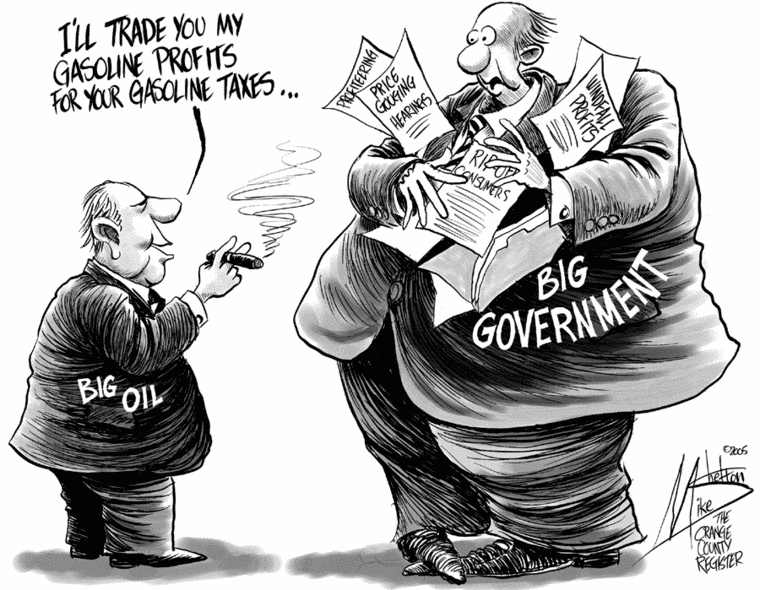
LLC In Corp Or Personal Name?
From a client:
Subject: LLC Partnership questionHi Kerry,I've been a partner of a start-up business which now is going to be formally incorporated as LLC taxed as a partnership. My question is whether I should become partner of this company myself or rather make my existing C corporation a partner? How can you compare advantages/disadvantages of the two approaches?thanks
My Reply:
Having your corp as the LLC member has all of the advantages as running your other income through the corp.
You can manipulate tax year timing with the corp's fiscal year. LLCs and individuals must use tax year ending 12/31/0X.
You can avoid 15.3% SE tax.
You also have more liability protection with the extra layer between the LLC and you.
Kerry
S to C and Back?
Q-1:
Subject: QuestionEarlier this year I decided to revoke my subchapter S and am now wondering if that was an appropriate decision. Is it possible to request re-instatement before I file this year's taxes? To whom do I petition? Does the IRS have a small business advocate? I am a micro-business (myself and a PT assistant). My business is financial brokerage - revenue is from commissions. Thanks for any input you can provide.
A-1:
Before you continue flipping back and forth between C and S, you need to engage the services of a tax professional who can give you guidance as to what is best for your unique circumstances. Making a decision such as this on your own is no different than taking potentially toxic medicine based on what your friends may have told you or you saw in a TV ad.
If you and your professional advisor do decide that remaining as an S is the best for you, s/he should be able to help you rescind the erroneous revocation via the special hotline IRS has for us practitioners.
Good luck.
Kerry Kerstetter
Q-2:
I paid $750 to a CPA (formerly with Deloitte an Touche) to request a rescision of the revocation request. He sent it to the wrong IRS dept and made one phone call that did not resolve anything. Please forward the hotline number you refer to and I will ask my accountant to call on my behalf. Appreciate your time!
A-2:
IRS has a web page with the special contact info for tax pros.
You still need to properly analyze which structure is best for you.
Good luck.
Kerry Kerstetter
Follow-Up:
Thanks much!!
Upgrading QuickBooks
From a client:
Subject: quick books
Hi Kerry...
Are you still recommending we upgrade to quick books 06? Apparently that comes out this week and my bookkeeper will be using it.
A:
It's not essential that you always have the most current version of QuickBooks. However, it's a good idea not to fall too far behind so that you can take advantage of the new features that make it easier to work with, as well as not fall victim to Intuit's sunset policy that orphans any version more than three years old.
For anyone currently thinking of upgrading to a newer version, I would hate to see them waste their money on the 2005 model, when the 2006 programs are so close to release. In fact, I should be receiving my copies of the 2006 programs any day now and the public should be able to order it now as well.
Kerry
Follow-Up:
Thanks, yes, they are releasing 2006 on the 11th...so since my bookkeeper is upgrading hers and you are too, then I need to get mine or not be supported, it sounds like.
Costco on line has it for $149. which is the cheapest, but maybe with Intuit's $80 rebate....that's not too bad in fact if they both hold.
A:
I'm not sure what your bookkeeper is doing, but I will continue to support whichever Windows versions of QB the clients are using. I don't really like using the older versions because they aren't as automated as the newer ones; but I do have all the QB versions from 1999 up to the most current installed on my computers and use whichever one is compatible with the data files the clients send me.
Over the past several years, I have found that the warehouse clubs have had the best prices for new releases off both Quicken and QuickBooks.
Kerry
Political Suicide?
David Letterman’s Top Ten Signs You've Run A Bad Campaign includes this one that the DemonRats love to repeat over and over. It’s actually a cornerstone of Queen Hillary’s campaign for a third term in the White House, as she and her co-president continue their attacks on Bush’s tax cuts.
5. You've pledged to “Tax America back to the Stone Age”
Charitable Deductions For Helping Someone Buy Your Home?
According to this press release from the Feds, Partners In Charity is falsely advertising that home sellers can claim charitable donation deductions for amounts they reimburse the charity for their buyers’ down payment assistance. As any tax pro knows, one of the requirements for a valid charitable donation deduction is nothing of value being received back. This kind of arrangement would obviously fail that test.
I went to the PIC website and tried to find that claim; but couldn’t. It may have been removed after the Feds’ complaint or the complaint may be based on other marketing materials used by PIC and its representatives, including verbal promises.
Some people may be wondering why a charitable donation deduction is better than just claiming the reimbursement as a normal selling expense and thus reducing the gain on the sale. The reason is that, for most home sellers, their entire profit is already tax free under the current rule that exempts up to $250,000 of gain per person ($500,000 per couple).
Gifting and 529 Plans
Q:
Subject: Increasing Gifting Limit to $12,000
Hello:
I saw your post on savingforcollege.com. I was wondering if you could answer a question.
If I used my $55,000 contribution for a college 529 plan in 2005 (11,000 X5) for contributions to 2009, can I add an additional $4,000 to what I have already contributed to make up for the accelerated gifting to $60,000. What would the procedure be?
Thank you very much for your time.
Rob
A:
That wasn't me posting there; but someone who found that info on my website.
The response to your questions from Joe Hurley sounds right.
No you cannot, because as the law is currently written your 2006 contribution must be more than $12,000 to be eligible for the spreading election. A $4,000 contribution would not be enough. You could make $1,000 contributions in each of the next four years to stay within the new, higher annual exclusion.
JoeGood luck.
Kerry Kerstetter
IRS Audit Profile
One of the themes I have long been covering has been the use of corporate structures by small businesses. While the reasons have mainly been for the additional tax saving opportunities and personal protection from many business liabilities and lawsuits, another benefit that I have only occasionally mentioned is the lower profile a small corporation has for an IRS audit than there is when reporting all business income on 1040s.
Reading this statement from the current IRS Commissioner on his performance in office, that point is very clear. Specifically, the following statistics he mentioned for the fiscal year ended September 30th:
Total individual returns audited increased by over 20% to 1,216,000 from 1,008,000 in 2004.
Audits of individuals with incomes over $100,000 surpassed 221,000, the highest figure in 10 years, and well over double the 92,000 completed in fiscal year 2001. The coverage rate in this category is still too low, but at 1.58% is double what it was four years ago.
Audits of small businesses organized as corporations turned up after years of decline. 17,867 were completed in 2005 against 7,294 a year earlier.Audits of larger corporations – those with assets over $10 million – also increased, up 14% from a year ago to 10,878. The coverage rate of 20% has rebounded significantly from that of 12% just two years ago.
The gist of this is that the IRS cross-hairs are definitely focused on 1040s with income over $100,000. While that is a large enough figure to attract attention among all of the 1040s filed each year, that kind of income is a tiny drop in the bucket in the world of corporations, where IRS focus is on those with millions and billions of dollars in income.
I wanted to check the percentage of corporate tax returns audited, but IRS statistics only go up to 2002. I downloaded the 2002 corp Excel spreadsheet and it shows the total number of corporate income tax returns with assets under $10 million as 5,186,852. Using the most recent number of audits of 17,867 gives an audit percentage of just 0.34%. With the number of corporations most likely higher in recent years, that percentage would be even smaller. Using the 1.58% audit coverage of 1040s with more than $100,000 of income, that works out to more than four and a half times more likely to be audited.
Tax Analysts looks at the Commissioner’s report.
One other statistic from the Commissioner is a little hard to believe:
Our toll-free tax law accuracy hit a high of 89%.
I suspect that, much like the political opinion polls being bandied about by the media, these stats were intentionally skewed.
Capital Gains, Dividend Cuts Could Bump AMT Fix From Reconciliation
First Three IRS Contracts With Private Debt Collectors Expected in February
Feds Bust More Scamming Tax Pros:
Section 179 For 2006
I have noticed some tax guides that do erroneously show the maximum Section 179 deduction dropping to $25,000 after this year; so this email wasn’t unexpected.
Q:
Subject: section 179 for assets purchased in 2006Hello,Sorry to bother you. We were completing some tax planing and I noticed on taxguru.org that there is a section 179 deduction schedule that shows $108,000 and 108,000 + COLA for years 2006 and 2007. I can't seem to find any support for that on www.irs.gov. My understanding was that 2005 was the last year for increased maximum deduction.Could you provide me with an irs link that supports the section 179 deduction amounts for 2006 and 2007?Thank you,
A:
If you download the IRS's recent announcement for 2006 inflation adjusted figures that I mentioned on my blog, you will find the following on Page 13 of that pdf file:
.18 Election to Expense Certain Depreciable Assets. For taxable years beginning in
2006, under § 179(b)(1) the aggregate cost of any § 179 property a taxpayer may elect
to treat as an expense shall not exceed $108,000. Under § 179(b)(2) the $108,000
limitation shall be reduced (but not below zero) by the amount by which the cost of
§ 179 property placed in service during the 2006 taxable year exceeds $430,000.
I hope this helps.
Kerry Kerstetter
Labels: 179
Deducting Motorhome
Q:
Subject: 179 on Motor-homeCan I take section 179 on a motorhome I am purchasing for my business even though I have taken 179 on previous assets in prior tax years. Is it a lifetime max of 100K or each year max?Also, Can I further depreciate the motorhome over a period of 3 years for the difference in the 179 deduction and the purchase price of $270,000?What other write-offs can I take (i.e. interest, gas, repairs)?Many Thanks,
A:
Each year, you start off with a fresh eligibility for the Section 179 deduction. What you claimed on the previous year's tax return doesn't affect this year's deduction. Many business owners actually budget their business equipment purchases accordingly, spreading them out over multiple years in order to be able to claim the maximum each year.
Assuming that your motorhome will be used 100% for business, and the total of Section 179 assets that you acquired during the year is less than the statutory limit ($420,000 for 2005) you can claim Sec. 179 on the motorhome and then depreciate the remainder of the cost over five years.
If the motorhome is being used 100% for business, all related expenses for it (fuel, insurance, repairs, license, storage, washing, etc) would be deducted on the same schedule as where you are claiming the Section 179 and depreciation.
If the motorhome is being used less than 100% for business, you will need to prorate all of the costs, including Section 179, to only deduct the business percentage. Of course, if the business usage is less than 50%, it is not eligible for any Section 179 deduction.
If you are serious about properly managing your business, you must be working one on one with a tax pro and not just relying on tidbits of tax info that you come across on the internet.
Good luck.
Kerry Kerstetter
Labels: 179






















